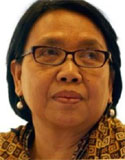
By Lies Marcoes
Jul 06, 2015
Every Ramadan, Muslims talk not only about fasting but also about helping orphans. Indeed, for those who are unable to fast and cannot make up for this later in the year, feeding orphans or the poor is seen as an equivalent deed.
In the Koran there are many verses that command us to uphold our prayers and to fast, followed immediately by a social obligation to help the poor: “Perform the prayers, pay Zakat.”
But who exactly are these “orphans” and, considering the dramatic and ongoing changes in our social structure, isn’t it about time to review this concept?
Parents Out Of the Picture
Generally, the Indonesian term Yatim piatu is used to refer to children who have lost both parents — Yatim is a child without a father, while piatu means a child without a mother. This interpretation is based on the assumption that parents are the sole source of both life and protection. However, the structure of society and the factors that cause children to become “orphans” have changed considerably in recent times.
Changes in our living space have altered the extended family structure throughout Indonesia. Traditional economic resources have been destroyed, but the economic resources that have replaced them — such as oil palm plantations, mining, oil and gas extraction and the cement industry — do not recognize a social or communal role of protection.
And so children and teenagers become social orphans: they have no parents, as their parents are absent, but they also receive no protection from the extended family because it — also — has become powerless.
Sadly, the functions of traditional communities have become inadequate as a means of help, and in fact create social pressure to preserve the only remaining form of defense: the self-respect of the (otherwise ineffective) extended family.
Historical Context
At the time the religious commands about helping orphans and the poor were revealed, parents were the source of protection, backed by their tribe or clan. In a traditional agrarian society, the functions of social protection and support, support from nature, and other mechanisms of protection, as documented in the moral guidelines in the Koran, were quite effective in aiding orphans and the poor.
In the social structure of historical Mecca and Medina, these functions grew and expanded in a communal society that depended on the strength of the clans, in which the tribal leaders carried out these protective functions. Islam then established rules, not merely as normative ideals (in the period when the Prophet Muhammad was still in Mecca) but also as explicit regulations for the procedure and its implementation (during the prophet’s time in Medina).
The Koran describes in great detail how these protection mechanisms are to be organized, such as the obligations to pay Zakat Fitra (annually at Idul Fitri, the end-of-Ramadan celebrations), Zakat mal (charitable donations), payments of fines for religious violations and it even presents specific calculations. This, at the time, was considered adequate to provide for orphans and the poor.
The problem is that in the modern socioeconomic structure, the term “orphans” should actually apply not only to those whose parents are no longer alive, but also those who have effectively lost their parents — such as children and adolescents whose parents are working in other provinces or as migrant workers abroad. These are children whose parents are alive but who have lost their entire social support network.
At the same time, the social functions of the extended family or clan can no longer be relied on, due to the interventions of corporations, the state and the wider context of economic globalization. The protective powers of parents and relatives have been eroded by same social changes that create these new social orphans.
Consider, for example, regions where many parents have gone away as migrant workers, such as West Nusa Tenggara, East Java, West Java, and West and South Kalimantan. The rates of child marriage in these regions are extremely high. The cause is obvious: children grow up without substitute parents who are able to safeguard their growth and development.
Religion of Justice
We can explore the changes in Indonesians’ living space further by looking at statistics. School dropout rates and maternal and child mortality rates are all higher for residents in regions that undergo significant changes in their living spaces: from natural forests to oil palm plantations, from irrigated rice field agriculture to the tourism industry, from natural beaches and coastlines to iron-sand mining sites.
These changes in the structure of society, in power relations, and in living spaces create a multitude of social orphans. They have generated massive wealth for some and massive exploitation for others. These changes have also altered social relations to become more exploitative and oppressive. In this changing social structure, the meaning of the term “orphans” thus has to be expanded as well.
The protection of orphans needs to be seen in a new perspective.
What we need are ideas rooted in religion and society that recognize the concept of social orphans. Only then can we seek a solution through the injunction to fast and provide for those in need. Without this, Islam will merely be a set of rituals that has lost its essence as a religion of justice that defends the poor and the weak.
Lies Marcoes is a women’s rights activist and executive director of the Rumah Kitab foundation.
Source: http://thejakartaglobe.beritasatu.com/opinion/commentary-islam-indonesias-new-social-orphans/




 Moderate Islamist here
Moderate Islamist here


0 comments:
Post a Comment